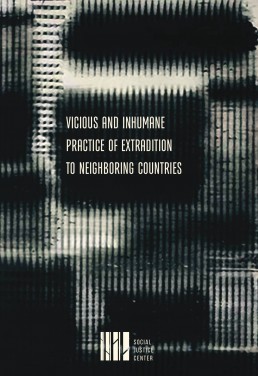საერთო ცხელი ხაზი +995 577 07 05 63


This document discusses the main problematic trends identified in the decision-making process of the extradition of persons from Georgia to the Russian Federation, Turkey, and the Republic of Azerbaijan in 2017-2020 and its compliance with international and national human rights standards.
In 2017-2020, a number of cases resurfaced concerning the unjustified, illegal practice of refusing international protection status to citizens of the Russian Federation, the Republic of Turkey, and the Republic of Azerbaijan and granting of extradition by the Ministry of Justice of Georgia, while interested parties were pointing to risks of torture, ill-treatment and the use of punishment in their home counties. For example, the cases of Yaroslav Sumbaev,[1] Ramzan Akhiadov[2] extradited to the Russian Federation are important to highlight, where the applicants pointed to the high risks of torture and ill-treatment in the Russian Federation. The case of Mustafa Emre Çabuk is also noteworthy, where Fethullah Gülen's follower M. Çabuk’s[3] extradition to Turkey was stopped only after a large-scale protest erupted.
The Social Justice Center (formerly the Human Rights Education and Monitoring Center (EMC)) in 2018 examined the cases of activists, opposition politicians, and journalist, living in Georgia, who were critical of the Azerbaijani government and, as a result, were subject to persecution[4] and pointed to the illegal practices in the process of granting them the status of international protection and the residence permit in Georgia. The analysis of these cases showed the Georgian government's political loyalty to the Azerbaijani authorities and raised suspicions of informal illegal cooperation between the two countries' law enforcement agencies. Similarly, in the cases of extradition of persons residing in Georgia to Russia and Turkey, a trend of political influences and inadequate assessments of the risks of serious human rights violations can be identified. In particular, the analysis of materials related to extradition cases reveals that the requests for the extradition by the Republics of Russia, Turkey, and Azerbaijan of their nationals from Georgia is mostly granted in such a way that the process does not take into account the human rights situation in the indicated states, especially the common practice of violating the principle of a fair trial in detention facilities. Even when a person being extradited refers to these (mal)practices, the Ministry of Justice and the Court waive the risks of right infringement by relying on diplomatic assurances provided by the State concerned and disregarding the reports of authoritative international organizations on the human rights situation in specific countries. At the same time, existing practice shows the frequency of application of the most severe measure of restraint against the persons subject to extradition and their inconsistency with the circumstances of the case.
The presented analytical document is based on the statements collected from the lawyers of persons subjected to extradition (the Social Justice Center interviewed 10 lawyers), the official legal documents received from the state agencies of Georgia, the court decisions, and the information disseminated through the media. Despite many of our requests,[5] the Ministry of Justice of Georgia has not shared important statistical information on extradition cases. The agency does not share, inter alia, information about the process of monitoring the legal status of already extradited persons and their situation. Only on October 3, 2019, did the Ministry of Justice inform us that in 2013-2019, the Russian Federation requested the extradition of a total of 23 persons, and in 14 cases the request was granted. In other words, the Georgian government has satisfied more than half of the extradition requests of the Russian Federation, which is a very high number.
The said document does not claim that it analyzes specific extradition cases in a nuanced manner. Access to concrete case materials turned out to be a challenging task due to technical barriers. The presented document is limited to a review of the main patterns and problematic practices of rights infringement in the extradition process. The goal of the presentation of these general findings is to promote the revision of the established problematic case law. As well as, to highlight the interest and need to stop the arbitrary practices of extradition to neighboring countries, especially to the Russian Federation.
The full reserch can be found in the attached document
[1] The case of Yaroslav Sumbaev, see: https://tabula.ge/ge/topic/128589
[2] The case of Ramzan Akhiadov, see https://reginfo.ge/politics/item/16808-saqartvelom-etnikurad-checheni-ramzan-axiadovi-rusets-gadasza
[3] The case of Mustafa Emre Çabuk, see: https://www.radiotavisupleba.ge/a/chabuki-tavisufalia/29048106.html
[4] An overview of the cases of Azerbaijani journalists and activists is available at: https://emc.org.ge/ka/products/azerbaijaneli-zhurnalistebis-da-aktivistebis-sakmeebis-mimokhilva
[5] The Social Justice Center addressed the Ministry of Justice on October 30, 2020 and March 15, 2021, requesting public information on the number of extraditions from Georgia to Russia, Turkey and Azerbaijan, but the Ministry of Justice did not provide any information.
The website accessibility instruction